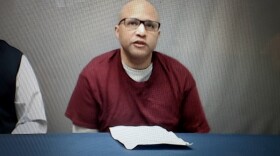Some Oklahoma lawmakers are keen on regulating independent political expenditures — also known as 'dark money' donations — used to influence state and local elections. An interim study of the subject in the House Elections and Ethics Committee discussed the dangers and possible solutions to a growing concern.
Tulsa Democratic Rep. Meloyde Blancett led the interim study on dark money before the House Elections and Ethics Committee on Monday.
Dark money refers to anonymous political contributions made through nonprofits with limited campaign finance reporting regulations. Generally, such untraceable contributions are used to purchase political advertisements in support of or against a certain candidate. Blancett has a simpler explanation:
"Essentially, it's laundry," she said. "It's just like laundering money, is what it is."
And it's completely legal, as Oklahoma and other states have been slow to regulate since the U.S. Supreme Court set a precedent more than a decade ago when it ruled in the Citizens United v. Federal Election Commission (FEC) case.
State Ethics Commission Director Leanne Bruce Boone says nearly $4 million — dark and otherwise — have already been spent to support Oklahoma political candidates in the 2026 General Election.
Committee members discussed how existing state policy addresses concerns about dark money, if at all, and whether candidates, campaigns and donors should be afforded certain privacy protections.
They also looked at examples of regulations other states have implemented to reel in dark money contributions and who makes them.

Oklahoma's policies and rules around dark money today
Boone said many of the laws surrounding campaign finance in Oklahoma mimic the federal government's, which requires certain levels of disclosure for campaign contributions for regular education-centered nonprofits, known as 501 c(3)s in the federal tax code, and political action committees, or PACs, listed as 501 c(4)s.
Organizations focused on educating the public about issues like voting rights don't have to disclose every single donor who gives money, because there is no advocacy for any specific candidate.
PACs, however, are specifically meant to advocate for political campaigns, so their donations are considered public for the sake of free and fair elections.
The top concern, Blancett and Boone both said, is the potential for individuals outside of Oklahoma to use existing state and federal statutes, and Supreme Court precedent from Citizens United, to influence voters by supporting specific candidates or causes while remaining completely anonymous.
"It's a donor giving money to an organization, often a non-profit but not always, that's not legally required to disclose its donors," Boone said. "Then that organization uses its money to buy ads, mailers, sometimes door-to-door campaigning…and voters don't know who's pulling the strings"
She said regulating dark money contributions in Oklahoma comes down to two big-picture items:
"What we're really seeking here, and I know this is your goal as legislators, and it's our goal as the Ethics Commission, is really transparency and voter confidence," Boone said. "We don't want voter apathy. We don't want people to have distrust in what's happening."
Oklahoma has consistently shown some of the lowest voter turnouts in the country when compared to other states — largely due to a high volume of elections each year, related voter fatigue and difficulties registering and accessing polling places.

How Oklahoma stacks up to other states
Oklahoma doesn't have the worst campaign finance reporting laws, Boone said. The Coalition for Integrity ranked the state as having the 12th-best campaign finance laws in the country in its 2022 state campaign finance index.
"I don't want us to feel terrible about what we have here in Oklahoma, because we actually have a really good structure and really good bones in terms of campaign finance," she said.
And while she wasn't able to find a more recent study, she said Oklahoma's laws haven't changed much since.
"The main safeguards we have involve disclosure rules, reporting timing, entity definitions and enforcement," she said. "So those are the tools in our toolbox."
Boone presented a list of potential improvements taken by other states that could translate to Oklahoma.
States like California and New York offer publicly accessible databases focused on campaign finance transparency. Maryland, Alaska and Arizona have implemented a searchable 'donor-chain-disclosure' feature in their state campaign finance reporting that identifies the origin point of large, otherwise anonymous donations.
Other states have started public awareness campaigns, automated compliance monitoring and auditing, as well as partnerships with universities to conduct related research publicly.
Some laws were passed by state legislatures, others by ballot measures.
Rep. Jim Olsen, R-Roland, expressed concerns about privacy and safety for candidates as it relates to campaign finance disclosures.
"The disclosure requirements on the larger donations, I guess the argument is out there that this violates the free speech privacy rights of those donors," Olsen said. "Would there be an argument that if full disclosure is required of the larger donors, could they be harassed? Could they be intimidated based on their political opinion?"
The question was posed to Elizabeth Shimek, senior counsel for the Campaign Legal Center, whom Blancett invited to testify at the study via Zoom.
"There's no right to spend big money anonymously in the electoral context," Shimek said.
The most guidance offered to state lawmakers and courts around regulating campaign finance transparency, she explained, is the U.S. Supreme Court's 2010 ruling in Citizens United, explaining that "lower benches" will have to decide the matter for themselves.






